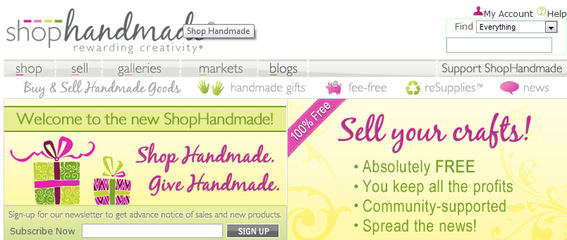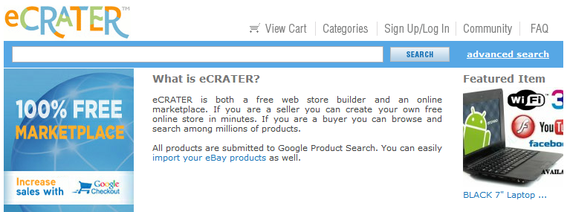Online marketplaces have been around for a long time. The world’s largest online retailer, Amazon.com, is a marketplace. Many businesses sell their products on online marketplaces.
Marketplaces, though, are not for everyone. This article lists ten reasons why they may — or may not — fit your business.
1. ‘One-of-a-kind’ Products with Little Competition
One-of-a-kind products with little competition, where you can charge a premium, are perfect for marketplaces. They will only generate additional revenue for your business. The marketplace fees will not impact your business as your margins should be able to cover the fees and desired profit. Below is an example of a vendor selling its one-of-a-kind original artworks on eBay.
eBay is a good place to sell one-a-kind products.
2. Manufacture your Own Products, Control Margins
If you manufacture your own products, you can eliminate the middlemen and manage the costs and profits more effectively. This allows you to offer more competitive pricing on marketplaces, which will lead to an increase in sales. To avoid cannibalizing your profits, work on building and improving your own site concurrently. Advertise your site on your marketplace listings to generate additional traffic. Once your site starts getting the desired traffic and sales, you can slowly reduce your presence on the marketplaces if your profits are impacted.
3. Outdated and Clearance Products
If you sell seasonal products or have limited storage space and need to reduce inventory frequently, consider marketplaces. The higher traffic on the marketplaces will help sell your products more quickly and you can treat the marketplace fees as the discount you would have otherwise offered on your site to sell the products. One tactic used by businesses that fall in this category is to brand these sales under a different name to avoid customers that expect the same discounts on other products.
4. Product-set Changes Frequently
If your product-set changes frequently, you likely need to put in extra marketing effort —even if you have a loyal customer base. Marketplaces are a good place to advertise and sell these types of products. Over time, you may develop a set of customers that recognize you as a vendor with frequent new products. Marketplaces could also help determine the kind of new products you need to introduce to avoid competition and generate more revenue.
5. Capture Market Share on Commodity Products
If you want to sell products at lower prices than your competitors to capture market share — even if this means losing money for a period of time — the high volume of traffic on a marketplaces could help. However, selling commodity products at the lowest price points is not a sustainable strategy.
6. Customers Shop on a Marketplace
You may have no option but to sell on a marketplace if you sell products that are the main focus of a niche marketplace. In this scenario, setting up your own site and driving the customers to it will take time and money. The right thing to do is to sell your products on the marketplace where your target customers shop. ShopHandmade.com is an example of a niche marketplace for selling hand-made products.
ShopHandmade.com is a niche marketplace for hand-made items.
7. Recommendations, Cross-selling and Up-selling
If you need more control to promote and sell your products, marketplaces are not the right place. You can have full control of the customer experience on your own site and no competition to sell the products. The costs will be higher to run the site, but you can have more control of the results without sharing the revenue with a marketplace.
8. Desire Lower-margin Revenue
If your primary focus is generating revenue regardless of the margin, then marketplaces are good places to sell your products. Carefully review the terms and conditions of each marketplace, however, as each one has a different fee structure. Also, avoid multiple marketplaces if you cannot keep your listings current, as that will result in out-of-stock products and discounts that are no longer active.
9. Customer Relationships Not Important
Marketplaces control the relationships with the customers. By selling products there, your business will not be able to directly interact with them. This means that you will not be able to offer discounts, promote special campaigns or email customers directly.
10. Just Starting, Do not Have an Ecommerce site
Setting up an ecommerce site requires time and investment. If you are just starting and do not have the funds to invest in building your own site, selling your products on a marketplace is a low-risk and low-investment option. As interest grows in your products, you can invest in your own site. eCrater and BluJay offer quick and cheap tools to setting up your store on a marketplace.
eCrater is a web store builder and an online marketplace.




